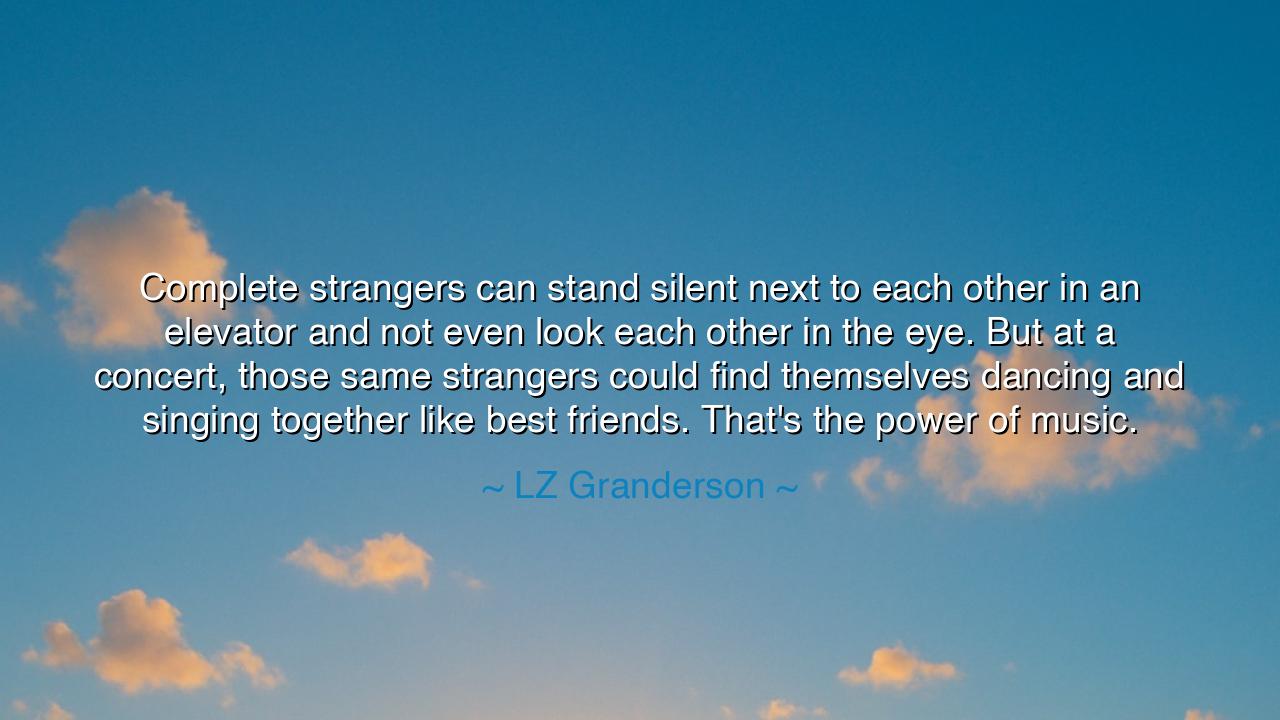
Complete strangers can stand silent next to each other in an
Complete strangers can stand silent next to each other in an elevator and not even look each other in the eye. But at a concert, those same strangers could find themselves dancing and singing together like best friends. That's the power of music.






LZ Granderson, a writer and voice of reflection in our times, once spoke with poetic clarity: “Complete strangers can stand silent next to each other in an elevator and not even look each other in the eye. But at a concert, those same strangers could find themselves dancing and singing together like best friends. That’s the power of music.” In this saying, he unveils the sacred truth that music is more than sound—it is a force that unites souls, dissolves barriers, and transforms strangers into companions, if only for a fleeting moment.
When he speaks of the elevator, he names the modern condition of isolation. We move side by side in our daily lives, sharing space but not connection. Fear, indifference, or simple habit keeps us silent. We are close in body but distant in spirit. Yet this is not the natural state of humanity. We are creatures made for community, for song, for shared joy. The elevator shows our separation; the concert reveals our unity.
At the concert, Granderson sees transformation. The same strangers who avoided one another’s gaze are suddenly bound together by rhythm and melody. Their voices join as one, their bodies move in unison, their differences vanish in the flood of shared emotion. Here is the mystery: music pierces through the walls we build, reaching into the soul where words alone cannot. It awakens what lies buried—the desire to belong, to celebrate, to connect.
This truth is not new. In ancient times, tribes gathered around the fire, singing and drumming together, finding strength and unity in shared sound. Soldiers marched to war with drums and horns, their courage multiplied by music. Civil rights marchers in America sang “We Shall Overcome,” and their voices, lifted in unison, gave them strength greater than fear. Again and again, history has shown that music unites where silence divides.
Consider the story of the Berlin Wall. Before it fell, musicians from both East and West Germany held concerts near its shadow. Rock bands drew thousands, and voices rose on both sides of the wall. Music could not tear down the concrete, but it broke the invisible walls of fear and despair. When the Wall at last crumbled, it was not only politics that brought it down, but also the spirit of people who had already sung together across its divide. This is the power Granderson names.
The deeper meaning of his words is this: music is the language of the soul. It requires no translation, no explanation. A song can bring together people who share no tongue, no culture, no history. It reveals the truth that beneath all differences, human beings share the same longings, the same griefs, the same joys. Music uncovers the unity that has always been there, waiting to be remembered.
The lesson for us is clear: do not underestimate the power of music in your life. Let it remind you that you are not alone. Sing, dance, and allow yourself to join in harmony with others. When you hear music, remember that it is not mere entertainment, but a bridge between souls. Seek out those moments where you can connect through it—be it in a concert hall, a church, a festival, or even in the quiet company of a friend with a guitar.
So let us carry Granderson’s truth: “That’s the power of music.” It breaks silence, it bridges division, it transforms strangers into companions. It is the invisible thread that binds humanity together across time and space. Guard it, cherish it, share it—for in music, we remember who we are: not isolated beings in elevators, but brothers and sisters in the great choir of existence.






AAdministratorAdministrator
Welcome, honored guests. Please leave a comment, we will respond soon